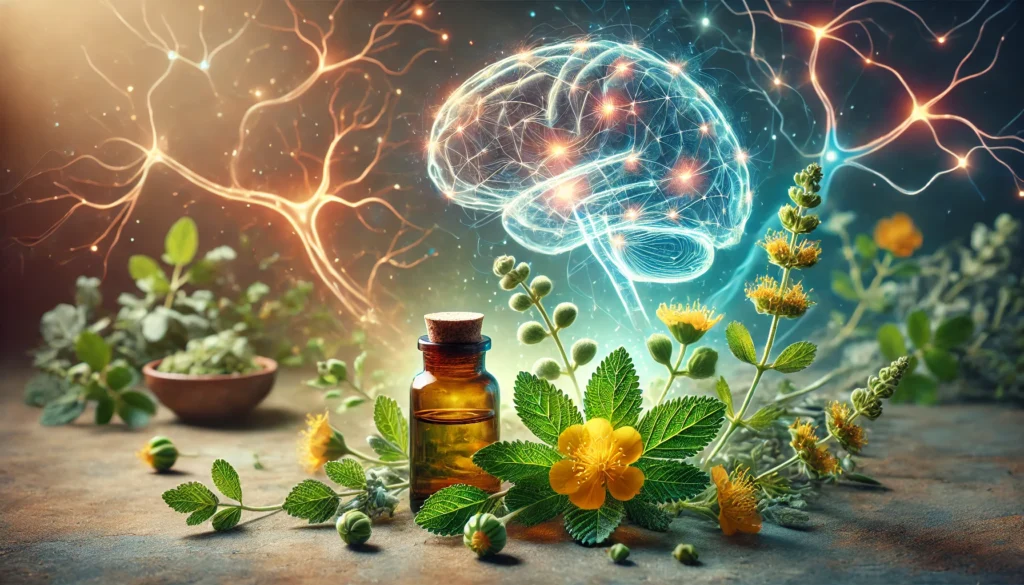Rue (Ruta graveolens), a medicinal herb used for centuries, is known for its unique bioactive compounds, including alkaloids, flavonoids, and essential oils. Traditionally used in folk medicine for a variety of ailments, Rue has recently garnered attention for its potential nootropic properties. This article will explore the chemical composition, potential nootropic benefits, recommended dosages, side effects, drug interactions, and other considerations for its safe use as a nootropic supplement.
You May Also Like:
Rue: Potential Nootropic Benefits, Dosage, Side Effects, Interactions and Other Important Information About This Supplement is an original (NootropicsPlanet) article.
Sources of Rue
Rue, a small evergreen shrub native to the Mediterranean region, thrives in dry, well-drained soils. Known for its strong aroma and bitter taste, Rue has been used historically in traditional medicine to treat ailments such as digestive issues, inflammation, and nervous system disorders.
While Rue can be found in nature, it is also available as a supplement, typically in the form of dried herb powders, extracts, or capsules. Rue is particularly notable for its rich phytochemical profile, which includes various active compounds, most notably:
- Alkaloids: Harmine, harmaline, and other β-carboline alkaloids are found in Rue and have been linked to neuroactive effects.
- Flavonoids: Rutin, quercetin, and other flavonoids in Rue contribute to its antioxidant properties.
- Essential Oils: Rich in volatile compounds like methyl-nonyl ketone and limonene, Rue’s essential oils have shown both antimicrobial and antioxidant activities.
Boost cognitive health and enhance focus with Rue (Ruta graveolens) supplements—Elevate your brainpower, Shop Now on Amazon!

Chemistry of Rue
Rue’s bioactive components form the basis of its therapeutic effects. The primary classes of bioactive molecules include alkaloids, flavonoids, and essential oils, which work together to deliver a range of effects on the body and brain.
- β-Carboline Alkaloids: The presence of harmine and harmaline in Rue is of particular interest to researchers studying its nootropic potential. These alkaloids inhibit monoamine oxidase (MAO), an enzyme that breaks down neurotransmitters such as dopamine and serotonin. By inhibiting MAO, harmine and harmaline may elevate levels of these neurotransmitters, thereby promoting enhanced mood, focus, and cognitive performance.
- Flavonoids: Flavonoids like rutin and quercetin exhibit powerful antioxidant properties, helping to neutralize free radicals and reduce oxidative stress in the brain. By protecting neurons from oxidative damage, flavonoids contribute to the preservation of cognitive function and the prevention of neurodegenerative diseases.
- Essential Oils: The essential oils found in Rue, especially methyl-nonyl ketone, possess anti-inflammatory and neuroprotective effects. This supports the herb’s traditional use in treating inflammatory conditions and suggests that Rue may help reduce inflammation-related cognitive decline.
Physiological Mechanisms of Rue in the Body and Brain
Rue’s bioactive compounds interact with several physiological pathways, particularly those involved in brain health and cognitive function. The herb’s nootropic potential stems from its effects on neurotransmitter systems, antioxidant defense mechanisms, and anti-inflammatory pathways.
- Neurotransmitter Modulation: The harmine and harmaline alkaloids in Rue are known to inhibit monoamine oxidase, particularly MAO-A, which breaks down serotonin, norepinephrine, and dopamine. By inhibiting this enzyme, Rue may increase the availability of these critical neurotransmitters in the brain, leading to enhanced mood, focus, and mental clarity. This action is comparable to the mechanism of some antidepressants, though Rue is generally milder in its effects.
- Antioxidant Activity: Rue’s flavonoids, particularly rutin and quercetin, act as antioxidants that protect brain cells from oxidative stress. Neurons are highly susceptible to oxidative damage due to their high oxygen consumption, making antioxidants crucial for maintaining cognitive health. By neutralizing reactive oxygen species (ROS), Rue may prevent the oxidative damage that can lead to neurodegenerative diseases like Alzheimer’s and Parkinson’s.
- Anti-inflammatory Effects: Chronic inflammation in the brain, often referred to as neuroinflammation, is associated with cognitive decline and various neurodegenerative conditions. The essential oils in Rue, such as limonene and methyl-nonyl ketone, possess anti-inflammatory properties that may help reduce inflammation in the brain, thereby protecting against cognitive impairment and supporting overall brain health.
Stay mentally sharp and energized all day with Ruta graveolens supplements—Unlock focus, Order Now!

Nootropic Benefits of Rue
While Rue is more widely recognized for its traditional medicinal uses, emerging research suggests that it may offer specific nootropic benefits. These cognitive-enhancing effects are linked to the herb’s ability to modulate neurotransmitter levels, protect against oxidative stress, and reduce neuroinflammation.
- Improved Cognitive Function: Rue’s β-carboline alkaloids, especially harmine, may enhance cognitive performance by increasing levels of serotonin and dopamine. These neurotransmitters are vital for regulating mood, focus, and memory. Some studies suggest that harmine may even promote neurogenesis, the growth of new neurons, which is essential for learning and memory.
- Neuroprotection: The flavonoids in Rue provide neuroprotection by scavenging free radicals and reducing oxidative damage to brain cells. This effect is particularly important in preventing age-related cognitive decline and protecting against conditions such as Alzheimer’s disease.
- Mood Enhancement: By inhibiting MAO-A and increasing serotonin levels, Rue may help alleviate symptoms of anxiety and depression. Serotonin is a key neurotransmitter involved in mood regulation, and its elevation can lead to improved emotional well-being and mental clarity.
- Reduced Mental Fatigue: The combined antioxidant and anti-inflammatory properties of Rue may help reduce mental fatigue, especially in individuals exposed to chronic stress or inflammatory conditions. By improving mitochondrial function and reducing inflammation in the brain, Rue may help sustain mental energy and focus over prolonged periods.

Dosage and Supplementation Guidelines
The appropriate dosage of Rue depends on the form in which it is consumed and the specific health goals of the individual. As with any herbal supplement, it is important to consult with a healthcare provider before beginning Rue supplementation, especially given its potent bioactive compounds.
- General Cognitive Enhancement: For general nootropic use, Rue extracts standardized for harmine and other β-carboline alkaloids are typically recommended at doses ranging from 100 to 300 mg per day. This is sufficient to promote cognitive benefits without exceeding safety thresholds.
- Mood and Focus Enhancement: For individuals seeking to enhance mood and focus, higher doses of Rue (300–600 mg per day) may be considered, as these doses are more likely to produce noticeable effects on neurotransmitter levels.
- Traditional Use Dosages: In traditional herbal medicine, Rue was often consumed as a tea, with dosages of 2–4 grams of dried herb per day. However, modern users should be cautious with such high dosages due to potential toxicity.
Side Effects and Safety
Despite its potential cognitive benefits, Rue should be used with caution due to its powerful bioactive compounds. The β-carboline alkaloids in Rue can have psychoactive effects at higher doses, and there is a risk of toxicity if the herb is not used correctly.
- Toxicity: Rue is known to contain phototoxic compounds, particularly furocoumarins, which can cause skin irritation and increased sensitivity to sunlight. High doses of Rue can also lead to gastrointestinal issues, liver toxicity, and neurotoxicity in some cases. Symptoms of Rue toxicity include nausea, vomiting, dizziness, and difficulty breathing.
- Psychoactive Effects: At higher doses, Rue’s alkaloids can produce psychoactive effects, including altered perception and hallucinations. This is due to the interaction of β-carbolines with serotonin receptors in the brain.
- Pregnancy and Lactation: Rue is not safe for use during pregnancy, as it has been linked to uterine contractions and miscarriages. Nursing mothers should also avoid Rue due to its potential effects on infant health.
Promote brain cell protection and boost cognitive performance with Rue—Act now, Available on Amazon!

Interactions with Other Supplements and Medications
Rue’s potent bioactive compounds can interact with various medications and supplements, necessitating caution for individuals on certain treatments.
- Antidepressants: Rue’s MAO-inhibiting effects can interact with selective serotonin reuptake inhibitors (SSRIs) and other antidepressants, potentially leading to serotonin syndrome, a condition characterized by excessive serotonin in the brain.
- Stimulants: Individuals taking stimulant medications or supplements, such as caffeine or amphetamines, should be cautious when using Rue, as the combination may overstimulate the central nervous system, leading to increased anxiety, agitation, or even cardiovascular issues.
- Blood Pressure Medications: Rue may lower blood pressure due to its vasodilatory effects. Individuals taking antihypertensive medications should monitor their blood pressure closely to avoid hypotension.
- Herbal Supplements: Rue may interact with other herbs that affect neurotransmitter levels, such as St. John’s Wort or kava. Combining Rue with other MAO inhibitors may increase the risk of side effects, including serotonin syndrome.
Risks for Individuals with Certain Health Conditions
Rue may not be safe for individuals with specific health conditions, particularly those with pre-existing cardiovascular, hepatic, or neurological disorders.
- Liver Disease: Due to its potential hepatotoxicity, individuals with liver disease should avoid Rue or use it only under medical supervision.
- Cardiovascular Conditions: Rue’s ability to lower blood pressure and affect neurotransmitter levels may pose risks for individuals with cardiovascular conditions, especially those taking medications for heart disease or hypertension.
- Mental Health Disorders: Due to its psychoactive properties, Rue should be avoided by individuals with a history of mental health disorders, such as schizophrenia or bipolar disorder, as it may exacerbate symptoms.
Conclusion: Should You Consider Rue as a Nootropic?
Rue offers intriguing potential as a nootropic supplement, particularly for individuals seeking to enhance mood, focus, and cognitive performance. Its unique combination of β-carboline alkaloids, flavonoids, and essential oils work synergistically to promote brain health and protect against oxidative stress and inflammation. However, due to its potent bioactive compounds and potential side effects, Rue should be used with caution, and under the guidance of a healthcare provider.
As research on Rue’s nootropic benefits continues to evolve, it may emerge as a valuable tool in the quest for cognitive enhancement. For now, it remains a promising, albeit potent, herbal supplement that requires careful consideration of dosage, side effects, and potential interactions.

References:
- Rue – Uses, Side Effects, and More. Retrieved from: https://www.webmd.com/vitamins/ai/ingredientmono-885/rue
- Ruta graveolens as a potential source of neuroactive compounds to promote and restore neural functions. Retrieved from: https://pmc.ncbi.nlm.nih.gov/articles/PMC7340976/
- A Candidate for Health Promotion, Disease Prevention and Treatment, Common Rue (Ruta graveolens L.), an Important Medicinal plant in Traditional Medicine. Retrieved from: https://pubmed.ncbi.nlm.nih.gov/35538827/
- Bioactive Compounds of Food: Their Role in the Prevention and Treatment of Diseases. Retrieved from: https://pmc.ncbi.nlm.nih.gov/articles/PMC6432691/
- Neuroprotective Potential of Limonene and Limonene Containing Natural Products. Retrieved from: https://pmc.ncbi.nlm.nih.gov/articles/PMC8348102/
Important Note: The information contained in this article is for general informational purposes only, and should not be construed as health or medical advice, nor is it intended to diagnose, prevent, treat, or cure any disease or health condition. Before embarking on any diet, fitness regimen, or program of nutritional supplementation, it is advisable to consult your healthcare professional in order to determine its safety and probable efficacy in terms of your individual state of health.
Regarding Nutritional Supplements Or Other Non-Prescription Health Products: If any nutritional supplements or other non-prescription health products are mentioned in the foregoing article, any claims or statements made about them have not been evaluated by the U.S. Food and Drug Administration, and such nutritional supplements or other health products are not intended to diagnose, treat, cure, or prevent any disease.


